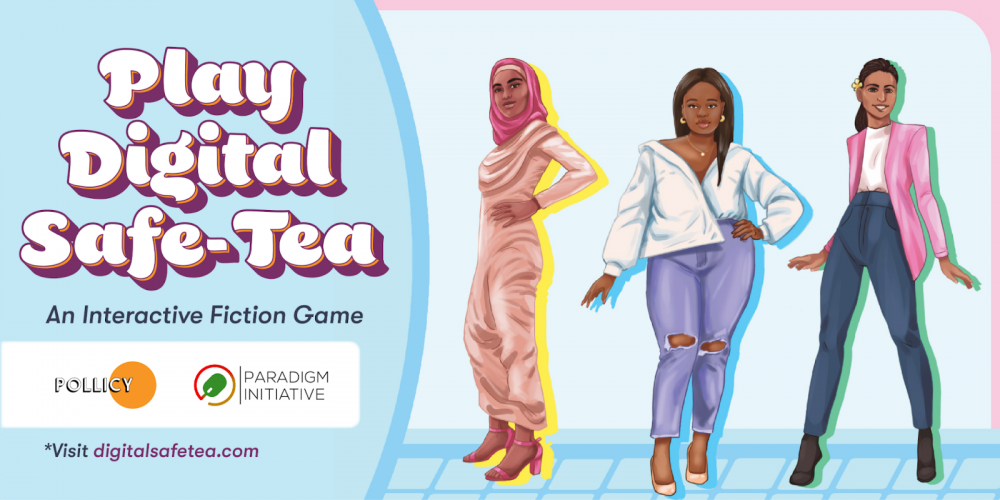
Digital SafeTea Assists Young African Women In Remaining Safe Online
Digital SafeTea assists young African women in remaining safe online
Digital security training sessions are frequently invitation-only events aimed at career women such as journalists and human rights defenders. With their new interactive fiction game, Digital SafeTea, Pollicy and Paradigm Initiative hope to change this.
Pollicy is a technology and consulting firm on a mission to use technology to improve and transform government service delivery to its citizens. Pollicy was founded in Uganda by Neema Iyer. Pollicy also works to empower African women through civic education and access to digital tools, in addition to assisting government agencies in connecting with citizens via digital tools.
The Paradigm Initiative is a non-profit organization dedicated to connecting marginalized young Africans to digital opportunities and to ensuring that every African citizen's digital rights are protected at all costs. With regional offices in Kenya, Cameroon, Nigeria, and Senegal, Paradigm Initiative is on a mission to accelerate the continent's digital inclusion.
Both organizations hope to reach thousands of African women and educate them about online and offline safety.
Secure Digital Environment
Tea is a portmanteau of the words 'digital security' and 'tea'. It is based on the story of three characters: Aisha, Goitse, and Dami. Each character is a representation of a distinct but relatable African woman.
As players enter the worlds of these three characters, they face digital threats such as zoom bombing, impersonation, and even Non Consensual Sharing of Intimate Images (NCII), also known as'revenge porn.'
After being presented with a scenario, players are prompted to select a response to the threat from the available options in order to advance to the next stage of the game. As players navigate the maze of threats, they are taught how to deal with similar situations in real life. Additionally, players are directed to websites and toolkits where they can further their education on their chosen subject.
The game's style is strongly reminiscent of children's books with a 'pick your own adventure' format, which Pollicy founder and Executive Director Neema Iyer credits with inspiring her when designing the game.
Digital SafeTea builds on Ayeta, a proactive toolkit for African digital rights activists launched earlier this year by Paradigm Initiative.
“Most internet users in Africa still lack access to digital security training. At Pollicy, we're interested in examining how creative media can be used to improve users' experiences with data and digital platforms. We've been playing around with community murals, dance, poetry, mockumentaries, chatbots, and interactive fiction.” The team felt it was critical to incorporate storytelling elements into the game, as traditional digital security training is frequently inaccessible.
“It's critical to employ art forms, storylines, and characters that are relatable to the players of our interactive fiction game.”
One aspect of Digital SafeTea that stands out is the game's vibrant graphic illustrations. The stories are set against vibrant backdrops that are dense with references to the African cities in which the characters live. Players will notice a reference to Nigeria's Feminist Coalition on one illustration (FemCo). The game is available in three African languages: English, Kiswahili, and Luganda. French and Pidgin English will be available in the near future.
Digital SafeTea comes at an ideal time, as global conversations about women's safety in digital spaces are taking place. In 2020, as more people use the internet for work and education, women and girls worldwide will see an increase in online violence and abuse. Additionally, women and girls frequently lack knowledge about how to protect themselves from such attacks and others. Additionally, a Pollicy study in five African countries discovered that 29.2 percent of respondents lacked knowledge about online safety and security. Additionally, the only action that 80% of their respondents took to ensure their online safety was to change their passwords frequently.
In light of this, games such as Digital SafeTea are assisting African women in remaining safe by arming them with information about digital security. It is critical to note, however, that the onus of online security should not be solely on women.
Companies in the technology sector must improve their response to online gender-based violence (OGBV). Recent developments in this regard include an announcement by Facebook, Google, TikTok, and Twitter at the recently concluded United Nations Women Generation Equality Forum in Paris reiterating their commitment to addressing OGBV.

